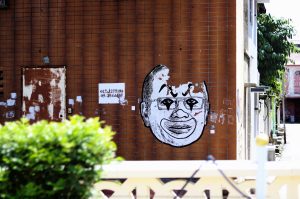Jailed former Malaysian Prime Minister Najib Razak yesterday issued a rare apology for his mishandling of the multibillion-dollar 1MDB corruption scandal, expressing “regret” at what happened on his watch but maintaining his innocence.
1Malaysia Development Berhad was established shortly after Najib’s election in 2009. In the ensuing years, Malaysian investigators claim, at least $4.5 billion was drained from the fund and laundered by Najib’s associates through a labyrinth of dummy corporations and bank accounts across the globe. The 1MDB scandal helped bring down Najib’s government at the general election of 2018, and has since led to criminal investigations in a number of other countries, including the United States, Switzerland, and Singapore.
In a statement that was read out at a press conference by his son, Mohamad Nizar Mohd Najib, the 71-year-old former leader expressed remorse about the fraud and theft connected to 1MDB.
“It pains me every day to know that the 1MDB debacle happened under my watch as minister of finance and prime minister,” Najib said in the statement. “For that, I would like to apologize unreservedly to the Malaysian people.”
In 2020, a court found Najib guilty of abuse of power, criminal breach of trust, and money laundering for illegally receiving around $10 million from SRC International, a former unit of 1MDB. In August 2022, Najib lost his final appeal in the case and began his 12-year sentence at Kajang prison in Selangor. The sentence was later halved by a pardons board chaired by Malaysia’s former king.
In yesterday’s statement, Najib maintained that he was “not the mastermind” of the scandal and that he was deceived by the fugitive Penang financier Jho Low, who remains at large. He referred to a report in The Edge, a Malaysian business magazine, alleging that Low and two executives at the Saudi oil firm Petrosaudi colluded to withdraw SRC funds without Najib’s knowledge in 2009 and 2010.
“I am still in deep shock knowing now the extent of the wretched and unconscionable shenanigans, and illegal things that happened in 1MDB,” he wrote. Najib added he had been punished politically and should not also be “legally victimized.”
“Being held legally responsible for things I did not initiate or knowingly enable is unfair to me and I hope and pray that the judicial process will, in the end, prove my innocence,” he wrote.
The letter came ahead of a Malaysian court hearing on October 30, which will determine whether to acquit Najib or ask him to enter his defense in a second 1MDB-related case. In this second case, the ex-PM faces four charges of abusing his power to obtain over $700 million from 1MDB and 21 charges of money laundering involving the same amount.
Since his conviction, Najib’s legal team has pursued every available avenue of appeal, hoping to overturn the guilty verdict, or at least allow the former leader to serve his sentence under house arrest. In April, three months after securing a royal pardon that halved his prison sentence, Najib’s lawyers filed a legal petition claiming the existence of an unpublished addendum to the royal pardon that was granted to Najib on January 29, which would allow the former leader to finish his sentence “under condition of home arrest.” It accused seven entities, including the Pardons Board, home minister, and attorney-general of concealing the king’s order “in bad faith.” In July, the High Court rejected the petition, saying that there was no evidence of such an order.
Yesterday’s letter suggests that Najib will continue to find ways to avoid any degree of legal accountability for a brazen white-collar theft that will cost the Malaysian public for many years. Posting on X yesterday, Bridget Walsh, a close watcher of Malaysian politics, described the apology letter as “an appeal for clemency/house arrest [without] substantive acceptance of responsibility.”

































